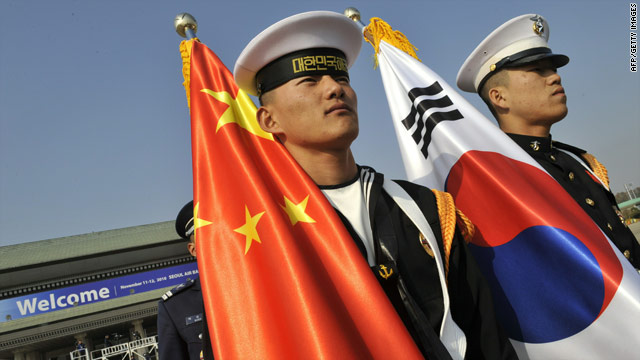|
|
本帖最后由 双籽宣言 于 2010-11-15 15:17 编辑
【原文标题】China's rising status makes it potential friend or foe
【中文标题】中国崛起:潜在的朋友还是敌人
【登载媒体】CNN
【来源地址】http://edition.cnn.com/2010/WORL ... e/index.html?hpt=C2
【译 者】 双籽宣言
【翻译方式】 人工翻译
【声 明】 本翻译供Anti-CNN使用,未经AC或译者许可,不得转载。
【译 文】

北京,中国(CNN)- 在G - 20峰会召开的数月前,中国已经被妖魔化了——被当作了阻碍经济复苏真正原因的“替罪羊”,并被指出存在包括失业,贸易不平衡和汇率操纵的问题。
华盛顿的批评者指责中国政府将人民币汇率人为的保持低水平从而享有不公平的贸易优势。他们说,人民币被低估了20%至40%。一些美国国会议员甚至要立法,威胁要对中国施行进口关税。
美国中期选举期间,一些候选人提出了促进中美贸易的政策,却遭到了其对手前所未有的炮轰中国的浪潮。他们传达的信息很简单:中国是一方邪恶的崛起力量;美国的就业机会全都流失到了中国。
“你要对那些指责中国抢走了美国工作的人们说什么?”我问中国外交部副部长崔天凯。
“有一些国家拿人民币汇率来说事,来给我们施加压力,想把它自己国内发生问题的责任转嫁到中国头上,或者说把中国当做替罪羊,我觉得首先这对中国是不公平的,也解决不了他们自己的问题,因为他们的问题并不是人民币的币值造成的,是他们自己的经济结构或者经济政策所造成的,他们必须要认真地对待自身的问题。比方说他们自己感冒了,让中国吃药,怎么能解决他们的感冒,治不好他们的感冒。”崔天凯回答说。
但是中国已经变得如此之强大,它随便打个喷嚏,整个世界就会感冒。
上个月,全球市场份额下降时,中国正宣布适当上调利率,这是三年来的首次调整。两天后,市场有所回暖,只是因为有消息称,中国的GDP,虽然缓慢,增速仍能达到10%左右。
现如今,对中国的羡慕中还充满了恐惧。比如说人们担心,中国已垄断了稀土元素,其适用范围从制造ipad公司的产品到制造导弹。中国提供着稀土95%的世界市场份额。几个星期前,日本、美国和欧洲都抱怨中国阻碍了其稀土出口。
中国准备拿稀土当作贸易战争中的“王牌”吗?中国否认了这一说法,但是恐惧依然存在。
分析家指出对于中国最近行为的恐惧。他们注意到在中国南海领土争端中其的强硬措辞,将这件事上升到了“国家核心利益”。这让与中国争夺该地区主权的其他国家十分担忧。
在日本扣押中国船长的事件中,其他国家看到了中国的愤怒。他们还看到了中国大规模的海、陆、空军事演习。
“令人印象深刻的军事演习和有关中国领土的激烈言论刺激了国内的消费,但是却在国际关系中产生了负面影响,”华盛顿智库尼克松研究中心的中国区主管德鲁汤普森说。
但是,日益紧张的局势使美国开始与包括日本、韩国在内的中国周边的国家保持密切的联系。当奥巴马本周出访印度时,他同意印度成为联合国安理会常任理事国,分析家称,这一行为一定会让中国不悦。
“中国可能有被包围的感觉,但这是它自己造成的”,一位作家说,“他们自己把印度推入了美国的怀抱,美印联姻在北京完成了。”
正在崛起中的中国既是潜在的朋友,又是敌人。对于一些国家来说,它是有价值的贸易合作伙伴;对于另一些国家来说,与中国之间存在着激烈的竞争。
中国外交部副部长崔天凯,也是一个资深的美国观察家,他说,美国不应该对中国的崛起感到恐惧。
“我认为美国应该有自信,中国永远都不会挑战美国的霸主地位的”,他对我说,“当全世界的领导是件很浪费成本的事情,我们承担不起。如果你们想浪费钱做这件事,就去做,我们永远不会做 。”
可能真的是这样,不过中国现在急切需要做的是去澄清它的长远规划。否则,其他国家只能看到其不断增长的经济军事实力,并且猜测中国这个亚洲巨人会不会在不远的将来展现它的力量。
原文:
Beijing, China (CNN) -- In the months leading up to the G-20 summit, China has been branded as the bogeyman -- a scapegoat for many of the intractable problems that dysfunctional economies are now facing. Prickly topics include job losses, trade imbalances and currency manipulation.
Critics in Washington accuse Beijing of keeping its currency artificially low to enjoy an unfair advantage. They say the renminbi is 20 to 40 percent undervalued. Some U.S. lawmakers have even proposed legislation threatening to impose tariffs on Chinese imports.
China-bashing reached a crescendo during the midterm elections in the U.S., when several candidates aired political ads that attacked opponents for promoting policies that boosted trade with China. The message was simple: China is a sinister rising power; U.S. jobs are being lost to the Chinese juggernaut.
"What do you say to people who blame China for lost jobs in the U.S.?" I asked China's deputy foreign minister Cui Tiankai in an interview last week.
"We're aware of the economic problems in some of the economies in the world, including some of the major economies," Cui replied. "But their problems are not caused by the value of Chinese currency. They have to look at their own economic structure, their own macroeconomic policies, to identify the real causes of their problems. If they caught a cold, they cannot ask China to take medicine because this will not cure their cold."
But China has become so big that when it figuratively sneezes the world catches cold. It has moved markets lately.
Last month, market shares dipped around the world when China announced a modest interest rate hike, the first in three years. Two days later, markets moved upwards on the news that China's economy, although slowing down, is still growing at about 10 percent.
Envy of China is now mixed with fear. There is fear, for example, that China has cornered the supply of rare earth elements essential in the manufacture of products ranging from iPads to missiles. China supplies about 95 percent of the world's market. Weeks ago, Japan, the U.S. and Europe complained that China is holding back its export of rare earth.
Will China use it as a "card" in a trade war? China says it will not, but fear remains.
Analysts blame that fear on China's recent behavior. They note China's tough words on the territorial disputes in South China Sea, elevating the disputes to the level of "core national interest." This has prompted concerns among other countries in the region that claim territorial rights in parts of the sea.
They see an angry China locked in political skirmishes with Japan over a collision of a Chinese fishing boat with two Japanese coast guard ships near disputed islands in the East China Sea. They also watched TV reports of large-scale ground, air and naval exercises by China's military.
"Dramatic military exercises and sharpened rhetoric about China's territory make for good domestic consumption but have a negative effect on foreign relations," said Drew Thompson, director of China Studies at The Nixon Center, a think tank in Washington.
But heightened tension has helped the U.S. consolidate ties with South Korea, Japan and other countries around China. When U.S. President Barack Obama visited in India this week, he even endorsed India as a future permanent member of the U.N. Security Council -- an idea that some analysts say must make China uncomfortable.
"China is probably feeling encircled, but it's their own fault," said author Gordon Chang. "They have driven India into the arms of the United States, so this U.S.-India tie-up is really a marriage made in Beijing."
China's status as a rising power makes it a potential friend and foe. To some, it is a valued trading partner. To others, it is a fierce competitor.
Deputy Foreign Minister Cui, a seasoned America-watcher, said the U.S. shouldn't fear the rise of China.
"I think the U.S. has to be confident that China will never challenge its position in the world," he told me. "We will never do that because leadership in the world would be very costly. We cannot afford it. If you want to waste your money on that, you do it. We're not going to do it."
It may be so, but what China urgently needs to do is to clearly communicate its long-term intentions. Otherwise, other countries can only look at China's growing military might and economic clout and wonder what the Asian giant will do with its power in the future. |
评分
-
1
查看全部评分
-
|